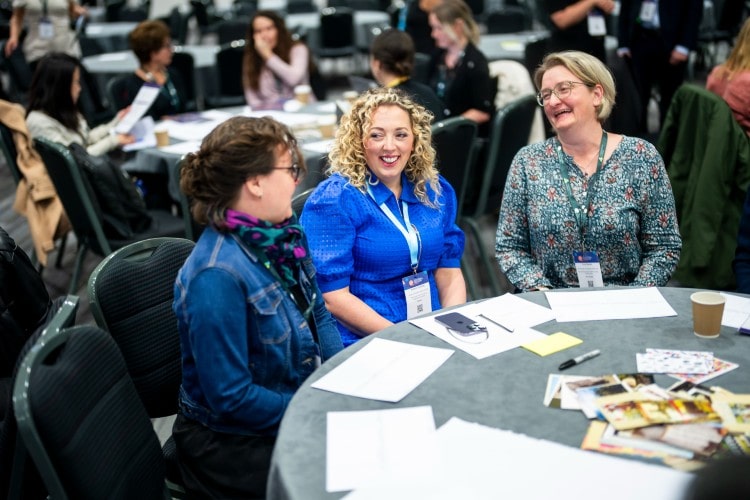Join a collaborative community of people who are passionate about improving health and care for their communities
What to expect from the Brisbane 2024 programme
The programme will share the latest research on quality and safety improvement. It will provide new ideas and international perspectives, outcomes-focused learning and plenty of opportunities to connect and collaborate during and after the conference.
You can expect:
- A bigger focus on rural and indigenous perspectives
- A bigger focus on networking and interactivity through activities, our programme design and collaborations
- Creating communities through PHN National Improvement Network Collaborative (PHN) and co-location of NINCo event (NINCo represents all 31 PHNs in Australia, and is providing the collective PHN leadership for quality and safety in primary care)
- Dedicated lived experience sessions led by our lived experience panel will support consumer-specific S&Q knowledge and capability-building
- Sharing hubs – an opportunity to share ideas on core topics or thought pieces; to include a 30-minute group discussion
- Facilitated ePoster presentation sessions – poster authors will give an overview of their poster and participate in an interactive discussion with the audience
- Shorter programme sessions to give you greater flexibility to build your own programme experience
- Senior Leaders Symposium – a revamped programme for senior leaders on Day 1 to allow them the time and space to come together to discuss and share ideas in a ‘safe space’
Brisbane content streams
The Brisbane programme will be structured around five content streams.
Safety
Patient safety in healthcare depends on understanding human factors, systems thinking, implementation methodologies and processes for digital and physical systems. Our focus will be on (but not limited to):
- Systems and challenges
- QI and safety across borders
- Approaches to Certification, Licensing, and Regulation
- Learnings from international care models and other industries
People
Encompassing patients and citizens into our planning, prioritisation, and decision making is essential. So is providing healthcare staff with a positive environment to deliver compassionate and kind healthcare. Content within this stream will be on (but not limited to):
- Empowering Individuals in their health journey
- Value-based care / Co-Design, Co-production
- Workforce, wellbeing and culture
- Private with public partnership potential
- Co-creating the power of patient experiences
Populations
The integration and collaboration of traditional hospital delivery, primary care, social care, and education are fundamental for delivering healthcare to populations and preventing illness and harm. Serving vulnerable and underserved populations is a key aspect of this approach. We will discuss topics such as (but not limited to):
- Universal health – Equality, diversity and inclusion
- Equity in healthcare provision
- An Aging population
Change
Here we focus on understanding change and improvement in complex systems. This includes behaviour change, organisational change. Programme content within this stream will focus on (but won’t be limited to):
- Utilising technology for better patient outcomes: Digital healthcare, innovation, disruption, IoM
- Sustainable healthcare – economical and environmental
- Culture, systems and science – navigating towards inclusive care
Leadership
To explore effective leadership in the modern era of healthcare, leaders must navigate complex challenges and promote progress across multiple dimensions, including patient outcomes, population health, sustainability, cost, and staff well-being. We will discuss diverse topics and challenges, including:
- Leadership strategies for embedding healthcare innovation
- Preparedness and resilience
- Approaches to workforce, wellbeing and culture
- Staff engagement and belonging
Who should attend the International Forum?
We welcome attendees from all health and care sectors and specialties, as well as service users and people with lived experience, family members and carers. Our attendees include students, doctors, nurses, managers, service directors, Quality Improvement (QI) specialists, patients, public health specialists and C-suite.
- Doctors/Physicians
- Nurses and nurse practitioners
- Medical assistants
- Primary and speciality care doctors/physicians
- Trainee doctors
- Consultants
- Care assistants and coordinators
- Healthcare administrators
- Medical directors
- Team managers/healthcare managers
- Quality improvement leaders, managers and advisers
- Chief Executives and other C-level executives
- Department leads e.g. Nursing Directors, Heads of Surgery, etc.
- Home healthcare providers
- Students and faculty
- Pharmacists
- Lived experience representatives and advocates
We have content to suit all levels of experience, whether you are new to quality improvement or an expert. If you are passionate about improving outcomes for patients and communities, we would love you to join us.




